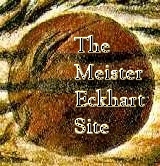|
|
||
 |
Meister Eckhart Home / Works by Meister Eckhart - Quotes / Inspired by Eckhart / Studies / The Papal Condemnation / Mail & Announcements / Links / Books |
DOUGLAS BURTON-CHRISTIE
The Pagan Philosopher's Quest for Holiness: Plotinus and his Circle
From Douglas Burton-Christie, The Word in the Desert, Oxford University Press 1993, pp. 49-54
Page 8
Notes
[1] On the growth of Greek philosophical schools in the second century, see R. Wilken, The Christians as the Romans Saw Them (New Haven: Yale University Press, 1984), 72-77: "(Lucian calls them bioi) similar to what we today would call religious movements:"
[2] Dodds, Pagan and Christian in an Age of Anxiety, 92-93; see also Bell, Cults and Creeds, 71: "Philosophy reinforced the tendency to a more personal and intimate form of religion and gave strength to the feeling that ceremonial purification is not enough, that the worshipper must have not only pure hands but a pure heart ... "
[3] P. Hadot, Exercices spirituels et philosophie antique (Paris: Études Augustiniennes, 1981), 63, 68.
[4] Porphyry, Vita Plotini [VPJ 3:5; in Plotinus, The Enneads, with Porphyry, Life of Plotinus, trans. S. Mackenna (London: Faber and Faber, 1963).
[5] A. D. Nock, Conversion (London: Oxford University Press, 1933), 179.
[6] P. Brown, The World of Late Antiquity (London: Thames and Hudson, 1971), 96.
[7] Fowden, "The Pagan Holy Man," 38.
[8] Fowden, "The Pagan Holy Man," 40.
[9] VP 3:33.
[10] VP 7:1-2. There were also listeners [ακροαται] who were more numerous, and who included, like many antient philosophical schools, women.
[11] Fowden, in "The Pagan Holy Man," 48-49, notes that "Porphyry pointedly distinguished the lover of wisdom from the athlete, the soldier, the sailor, the orator and in general from all those whose calling involved them in manual labour or the world of affairs; and Eunapios makes clear that he regards any intellectual from a genuinely poor background as an exceptional and noteworthy phenomenon."
[12] On the increasingly marginal positions of some pagan philosophers in late antiquity, see Fowden, "The Pagan Holy Man," 54ff; for an alternate view, see Brown, "The Philosopher and Society," 3, 7-10.
[13] Senators: VP 7:29-30; women: VP 9:1-5.
[14] VP 12:1.
[15] VP 9:16-18.
[16] Although Plotinus cannot be said to have been the head of a "school" in Rome, he was a diadoke, a teacher of a philosophical tradition or "school of thought," who interpreted the views of one of the more classical philosophers of old. In Plotinus's case, Plato was the philosopher whose work was the primary object of interpretation. On Plotinus as a diadoke, see Porphyre: La vie de Plotin, travaux préliminaires, ed. L. Brisson et al. (Paris: J. Vrin, 1982), 251.
[17] VP 2:3-6.
[18] VP 8:21-22.
[19] VP 1:1.
[20] Enneads IV.8.4.
[21] Enneads II.9.15.39. By virtue, Plotinus meant primarily the purificatory virtues, which prepared the soul for contemplation; see Enneads VI.7.36.6: "Purification has the Good for goal; so the virtues, all right ordering, ascent within the Intellectual, settlement therein, banqueting upon the divine - by these methods one becomes, to self and all else, at once seen and seer; identical with Being and Intellectual - Principle and the entire living all, we no longer see the supreme as external; we are near now, the next is That and it is close at hand, radiant above the intellectual." He also included social virtues in this process of purification and maintained that they must never be separated. For other examples of the place of virtues in the pursuit of philosophy, see Wilken, The Christians as the Romans Saw Them, 80.
[22] Enneads V. 1, 8, 10.
[23] Enneads II. 9, 6, 24-26.
[24] VP 20:30; E. R. Dodds, in "Tradition and Personal Achievement in Plotinus," Journal of Roman Studies 50 (1960):1-2, points out that one should be wary of taking this too literally, for to some extent at least, Plotinus used the Platonic texts as "authority" for his own speculations. This is a helpful qualification in the sense that it keeps us from thinking of Plotinus as slavishly copying Plato. However, Dodds goes too far in saying that had Plato never lived, Plotinus's thought would have taken the same structure and direction. Plotinus's thought is so steeped in Plato that it is difficult to imagine what shape his thinking would have taken without his great predecessor.
[25] Pierre Hadot, Plotin, ou la simplicité du regard (Paris: Librairie Plon, 1963), 12.
[26] Enneads IIL4.3.22.
[27] Dodds, Pagan and Christian in an Age of Anxiety, 84.
[28] Enneads I.4.10.
[29] Enneads IV.8.8.
[30] Enneads VI.9.9.59: "Thus we have all the vision that may be of Him and of ourselves; but it is a self wrought to splendor, brimmed with the Intellectual light, become that light, pure buoyant, unburdened, raised to Godhood or, better, knowing its Godhood, all aflame them."
[31] VP 13:1.
[32] VP 18:6-8.
[33] VP 3:35.
[34] VP 18:2.
[35] VP 4:10-11.
[36] VP 13:15-16.
[37] Enneads III.7 1.7-16.
[38] Marie-Odile Goulet-Cazé, "Plotin, professeur de philosophie," in Porphyre: La vie de Plotin, 265.
[39] Goulet-Cazé, "Plotin, professeur de philosophie," 266.
[40] Hadot, "Exercices spirituels," 48.
[41] VP 8:8.
[42] Brown, "The Philosopher and Society," 17.
Cf. Plotinus,
The soul's movement
will be about its source,
Music leads to the absolute beauty
Plato, Books
can be your worst enemies |||
Plato
Home Page
||| Christian
mysticism ||| How to study Meister Eckhart?